Savoring the Chaos: Issue No. 13

The French Saboteur
It’s been quiet at Château Dépaysement. Too quiet. The kind of quiet where my gut tells me trouble’s on the horizon.
Denise is in the U.S. visiting family, and I’ve been left in charge. Mr. Mom, dog wrangler, and groundskeeper-in-training. You’d think this would be simple. Feed the dogs. Keep the house standing. Don’t burn anything.
And yet, here we are.
Because in France, tranquility has a short shelf life. It’s about as long as it takes for a mole to redecorate your gravel courtyard.
The Calm Before the Dirtstorm
The trouble started last week on one of those deceptively peaceful Loire mornings that make you think you’ve outsmarted chaos. You never have.
The morning started normally enough: espresso, a quick scroll through emails, Sully snoring beside my desk. The light came in through the stone window like it always does, soft and forgiving. The kind of light that makes you think you’re living the dream.
I stepped outside with my Yeti mug, admired the stillness, and that’s when I saw them. Fresh mounds of dirt. Perfectly conical, smug little eruptions scattered across the courtyard.
Moles.
Not the kind that stay in the fields where they belong. No. These were French moles: artistic, self-assured, and absolutely convinced the property had changed ownership to them overnight.
They’d moved in without notice, no deposit, no paperwork.
Basically, it’s a mole’s version of Airbnb, and our gravel terrace had just been listed.
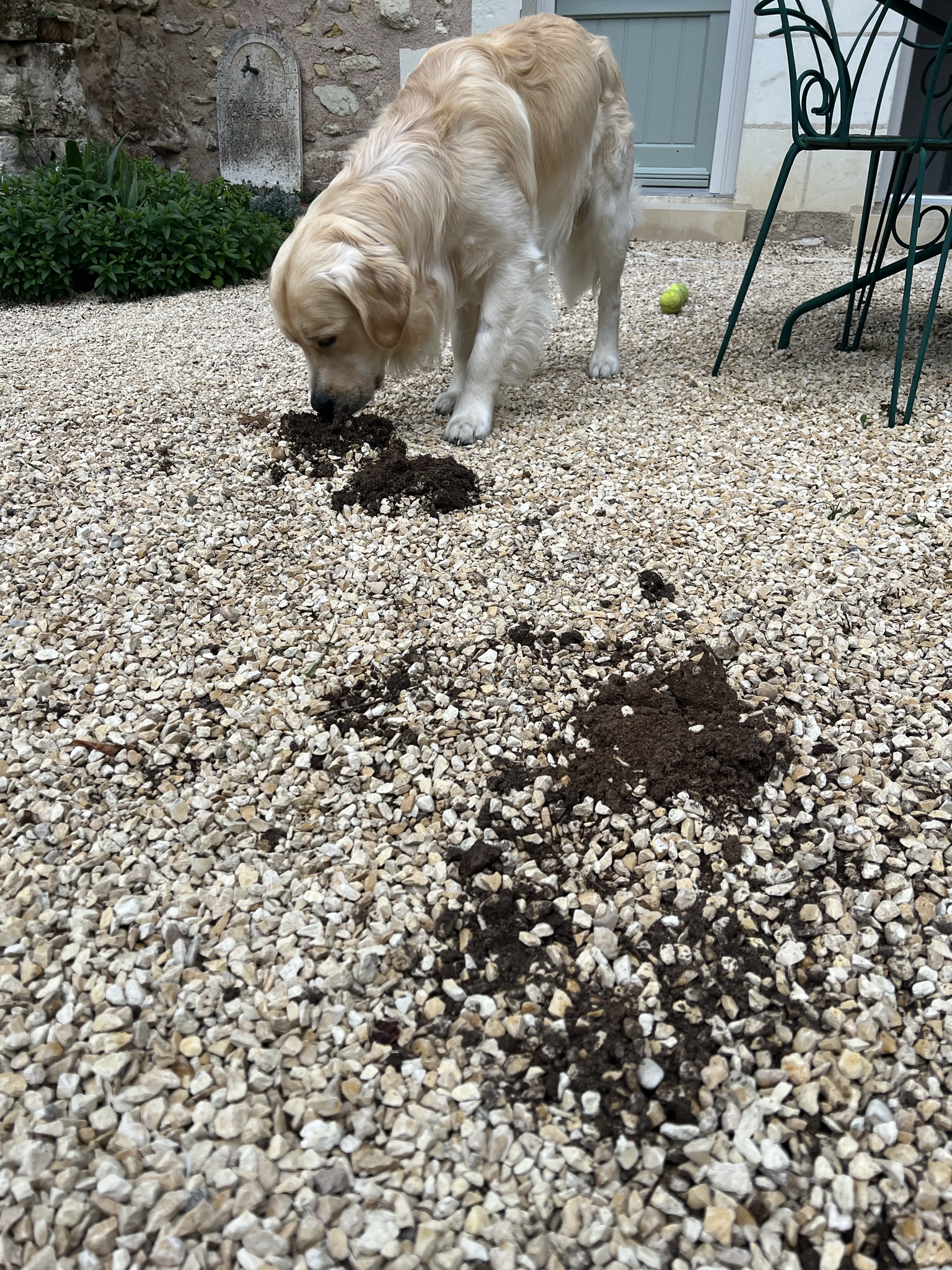
I didn’t have time for this, not today. And since I had no idea how to actually solve the problem, I did what any rational man would do: tamped the dirt down, muttered a few words unfit for translation, and moved on. I can figure it out later.
But that strategy wasn't very solid. Because now, Viggo has joined the war.
Enter Viggo
For those of you new to our saga, Viggo is our French-born Golden Retriever. He’s Sully’s protege, his shadow, and, depending on the day, his tormentor.
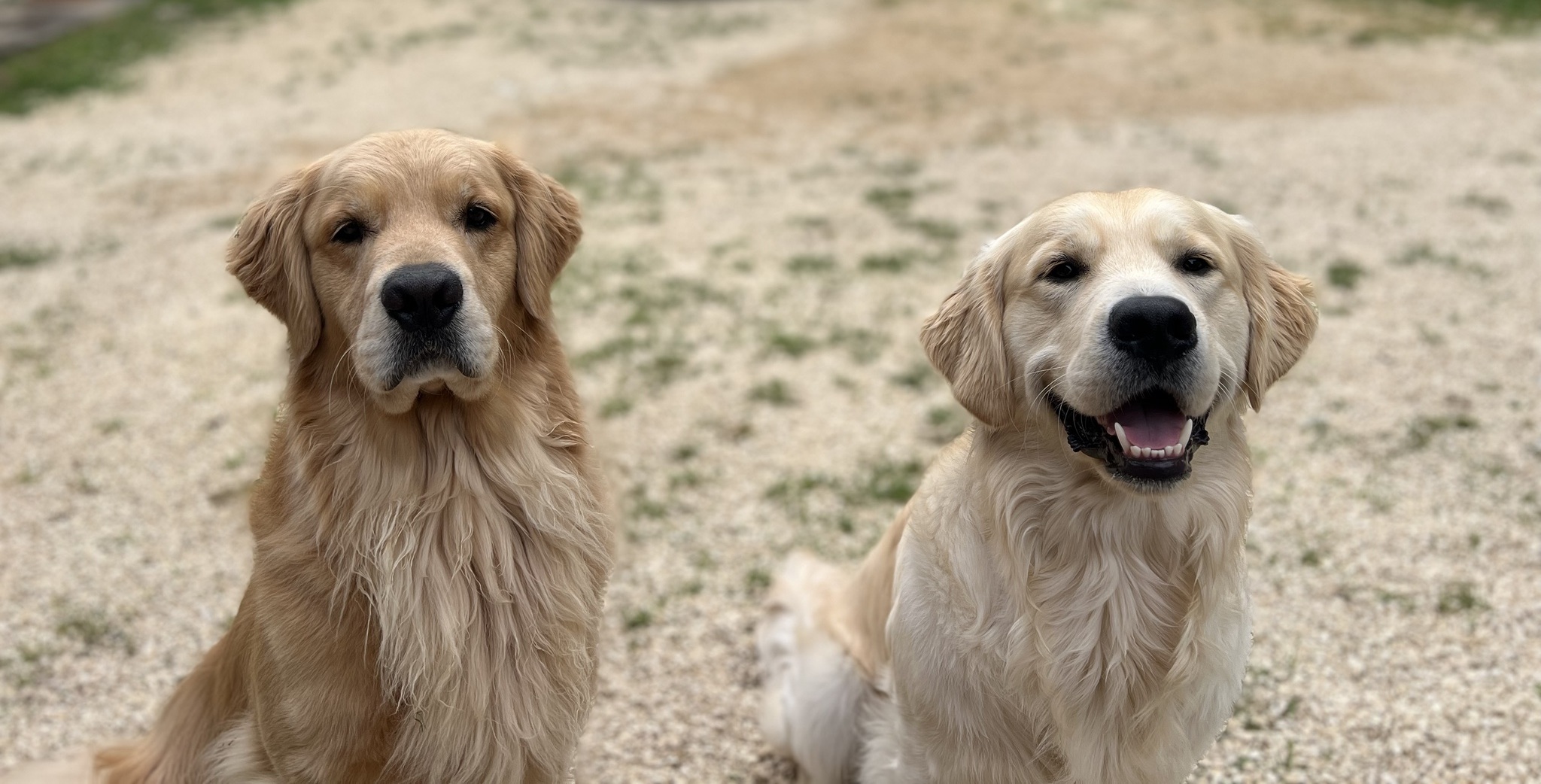
Where Sully is wise and measured, the seasoned American expat, Viggo is chaos in a blonde coat. The breeder warned us — well, told us about his charming personality (smart, loving and mischievous as hell) — but figured, with our experience raising Goldens, we could handle him. And he’s going through a phase.
He’s what dog psychologists might call “emotionally reactive.” Translation: he loses his mind if you leave him alone for more than twelve minutes.
Maybe I should have remembered the moles.
It was mid-morning. I was at my desk writing when I heard that sound — the kind that makes your heart jump — the blood-curdling scream of a woman who’s seen something unspeakable.
I bolted into the living room.
Denise had Viggo cornered on the new rug, eyes blazing. He was frozen, ears back, a statue of pure guilt. His paws were caked in mud.
Apparently, one of the molehills had caught his attention earlier that morning, and while D was watering the garden, he’d gone full excavation mode. Before she hosed him down, she’d gone inside to grab towels. But Viggo had other ideas. Realizing he might be in trouble, he sprinted back inside — directly onto the one item in the house still under warranty: D’s new rug.
Denise was yelling. Viggo was trembling. Sully, as usual, was pretending not to know either of us.
I took one look at the scene — rug, dirt, chaos. Then said, in my best Dad Voice, “Viggo.”
He knew what was up. As I stepped toward him, he bolted for the door. But before he got there, he made a hard detour — right on top of the brand-new couch.
Denise screamed again.
That was the moment I realized something fundamental about French dogs: they may be adorable, but they’re also emotionally French. Sensitive. Dramatic. Slightly manipulative.
While Mom’s Away
Now, Denise is back in the States visiting family.
Before she left, she made one final plea.
“Please,” she said, “keep him from digging holes in the gravel. And for the love of God, watch the new rug and couch.”
I nodded like a man who understood responsibility. That illusion didn't last long.
After that debacle with muddy paws from the mole-dredging, I thought we’d reached an understanding.
Turns out, Viggo had other plans.
Monday morning, I dropped Denise off at the train station, I made the drive back from Tours wondering how I was going to keep my mind off her being so far away for ten days.
When I got home, the first thing I noticed was silence. Yes, both dogs were staring out the window at me, but there wasn’t the usual animation. Viggo was quietly percolating behind the sliding glass door, while Sully had this odd look on his face. I had a feeling I knew why.
Opening the door, the first thing I noticed was the chewed laptop cord lying next to the sliding glass door, right where Viggo left it as he gnashed his teeth with anxiety.
Black plastic. Copper wiring. Bite marks.
It looked like a small explosion had taken place. The kind of thing French authorities would describe as un incident domestique.

Viggo had struck again.
Before I left, I’d made sure they were both confined to the cave part of the house. It's nice and cool, with a full view of the yard out the window, and nothing to get into. I made sure of it.
Except the cord to D’s laptop. I hadn’t even noticed it was still out. But Viggo did.
I didn’t yell. I didn’t even speak. I just held up the cord and said, “Why?”
He blinked. If dogs could shrug, he would have.
He wasn’t hungry. He wasn’t angry. He was expressing himself — artistically, destructively, and in 220 volts.
Back to the Front
By late afternoon, I thought maybe — just maybe — we were in the clear. The gravel was tamped down, the moles seemingly scared away by Viggos backhoe skills, and both dogs napping peacefully inside.
The house was quiet again, the kind of silence that gives you hope and makes you suspicious at the same time.
Then Viggo stood up and sprinted down to the caves.
Of course I followed suit. Something was up. Sully and I headed after him. When we got there he was at the window, frozen, staring outside with the intensity of a man spotting a UFO. Sunlight poured through the glass, illuminating his fur like he was having a religious experience.
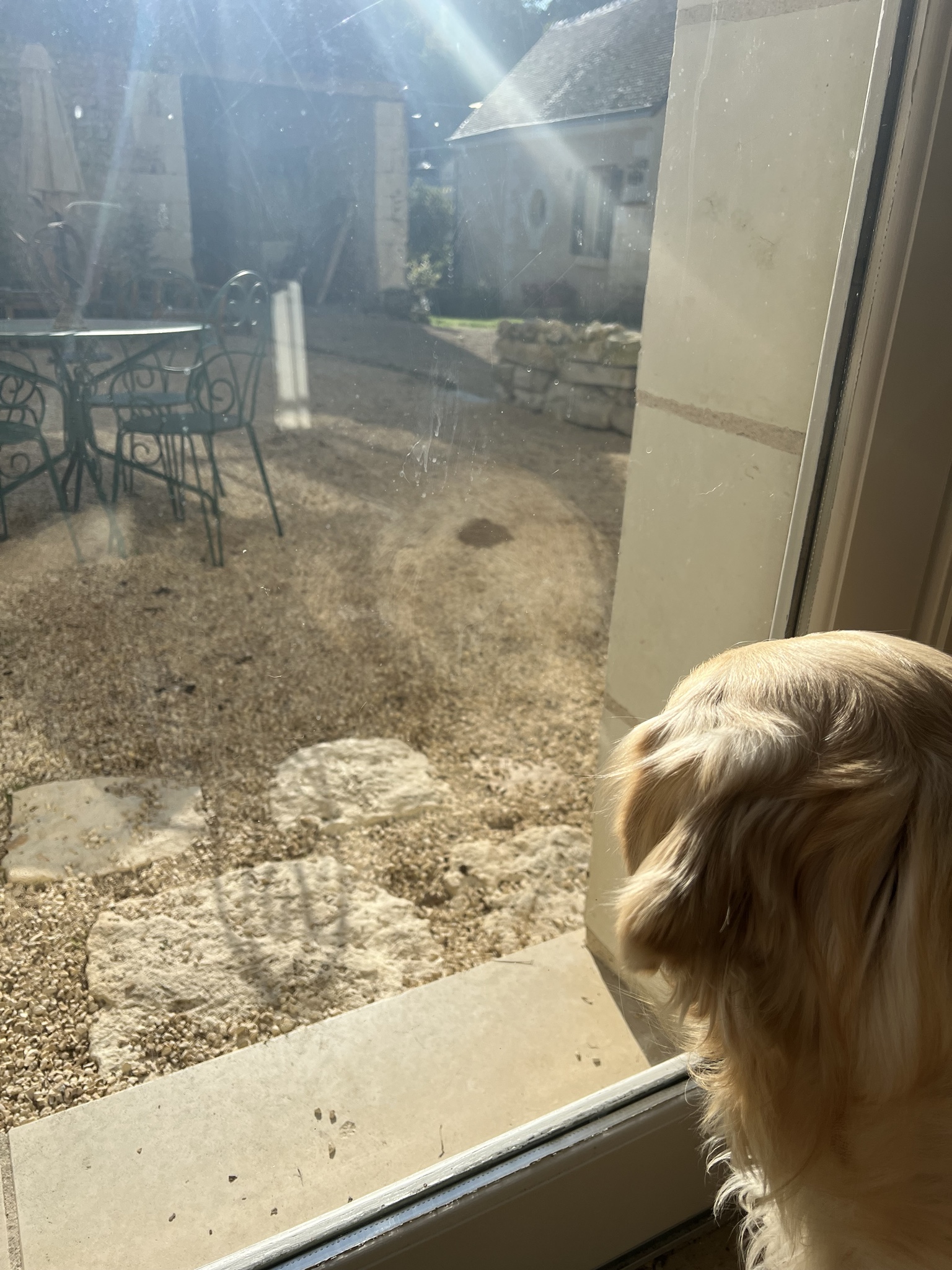
I followed his gaze, and there it was. Another molehill. Fresh. Damp. Defiant.
You could practically hear the Mission: Impossible theme start to play in his head.
“Leave it,” I said.
He didn’t move.
“Viggo,” I said again, like a parent reasoning with a toddler holding scissors.
Still nothing. Just that silent, electric standoff between species.
Finally, I opened the door. He trotted out, sniffed the mound, paw hovering, tail poised. It was the picture of temptation itself. If he didn't listen to me, I was ready.
He gave one long, serious sniff, then moved on.
Progress. Maybe.
Sully, of course, followed behind like the old pro he is. One sniff, a small grunt of disinterest, and then on to see what the dogs across the street were doing. If dogs could roll their eyes, he would’ve.
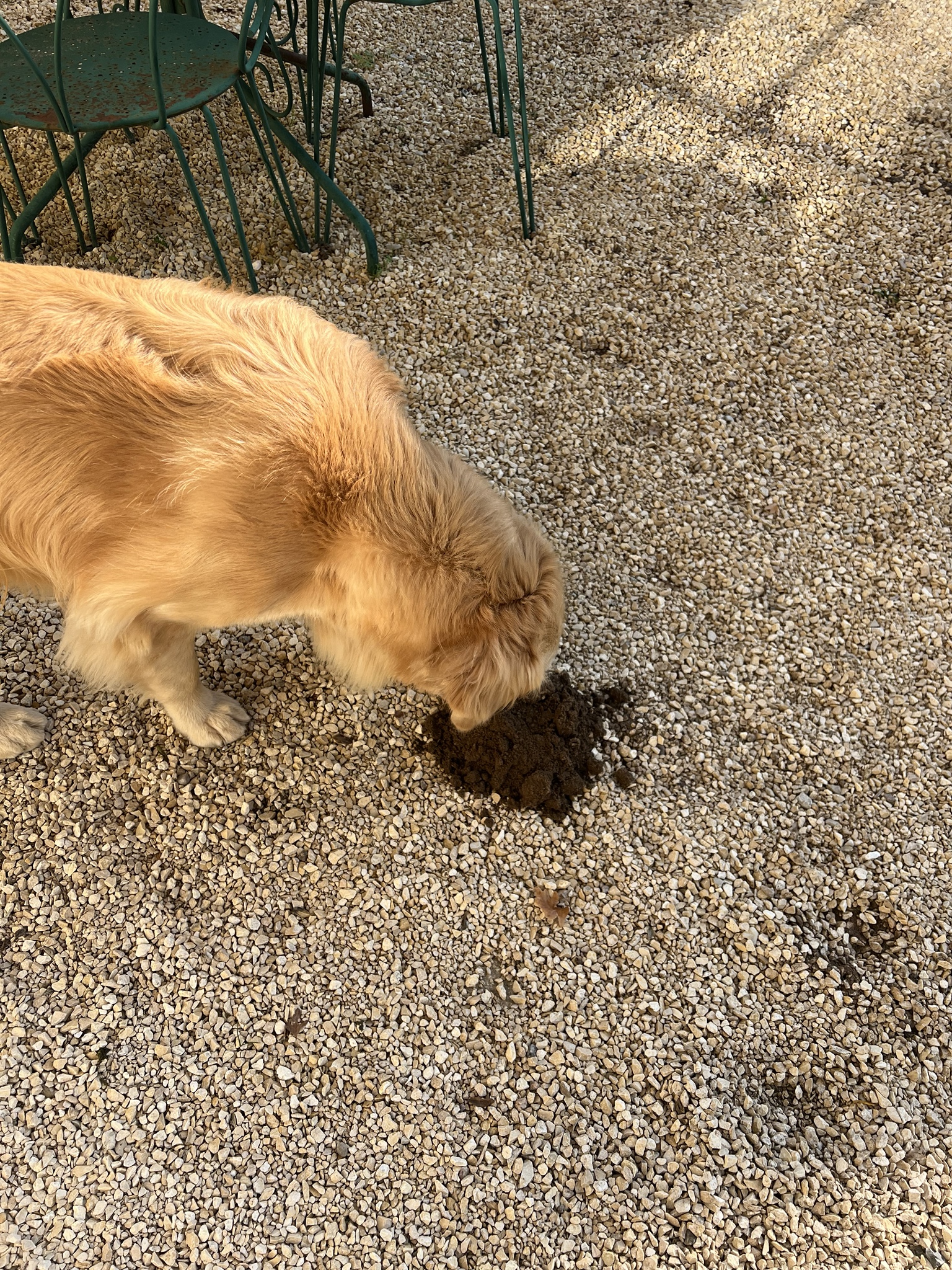
It’s these little victories that make me believe we might all survive Denise’s trip. Though I know deep down, somewhere under that gravel, the moles are regrouping. And Viggo? He’s just waiting for the call to action.
The next morning, I stepped outside with coffee and a fragile sense of optimism.
That’s when I saw them: four fresh molehills lined up like runway lights.
Viggo was already there. Sniffing, tail wagging, eyes wild with purpose.
I swear he glanced back at me with a look that said, Permission to engage?
“No,” I said, firmly. “Leave it."
He didn’t.
Within seconds, dirt was flying like confetti. His front paws were a blur. Pebbles arced through the air.
In two seconds, the gravel looked like a miniature battlefield. He’d gotten down four inches that fast. I yelled. He froze, instantly transforming into a guilt statue. Nose down, tail between legs, but not before one last, triumphant snort into the dirt. Then he took off before I could get to him.
I called him back and rinsed his paws off while growling at him.
I tamped the holes down again, muttering about the futility of rural life and wondering how long I can hold off asking Pascal for help.
By that afternoon, they were back. The moles. The dirt. The chaos.
And once again, Viggo was on patrol, convinced this was his noble calling.
Why Fight It?
There’s something beautifully French about this whole ordeal.
You spend years chasing the dream — the vineyard views, the stone house, the slower life — and then life gives you moles, chewed cords, and a dog with separation anxiety.
Maybe this is the real France. Not the postcard version, but the everyday absurdity that comes with actually living here.
Because the truth is, every time I tamp down a molehill, I think about the people who used to live here. Farmers, laborers, winemakers. All fighting their own small wars with the land.
Now it’s me, in a Florida State sweatshirt, wielding a garden tamper like a man defending civilization from chaos.
It’s evening now as I write this. The house is quiet again. Viggo’s asleep beside Sully, both of them looking like angels in that deceptive way dogs do.
The gravel is calm, for now.
But I know what’s coming. Somewhere under there, the moles are regrouping.
And in the corner of the room, Viggo’s paws twitch in his sleep, probably dreaming of dirt.
I look at him and can’t even be mad.
He’s not bad. He’s just French — emotional, misunderstood, and slightly destructive when left alone. I suppose that makes us a perfect match.
So for now, it’s just me, the moles, and a young French dog who believes chaos is love.
And maybe, just maybe, he’s right.
A December in Alsace
Finding warmth, wine, and wonder between Strasbourg and the Vosges.
There are corners of France that seem to have made a deal with winter. Places where the cold doesn’t bite so much as it glows. Alsace is one of them.
During the winter we spent in Burgundy, one of my sisters was visiting us. We decided to head up to Alsace to show her the legendary Christmas markets. The three of us and Sully traded the winter grisaille hanging over Beaune for something brighter, crisper, and improbably cheerful.
We stayed in Gertwiller, a village that smells faintly of gingerbread and fermenting grapes. Which, as far as combinations go, isn’t bad. Our gîte was tucked into a working winery, the kind of place where you fall asleep to the low hum of barrels settling for the season. The owners greeted us with a bottle of their Riesling and the type of kindness that reminds you hospitality is still alive and well in rural France.
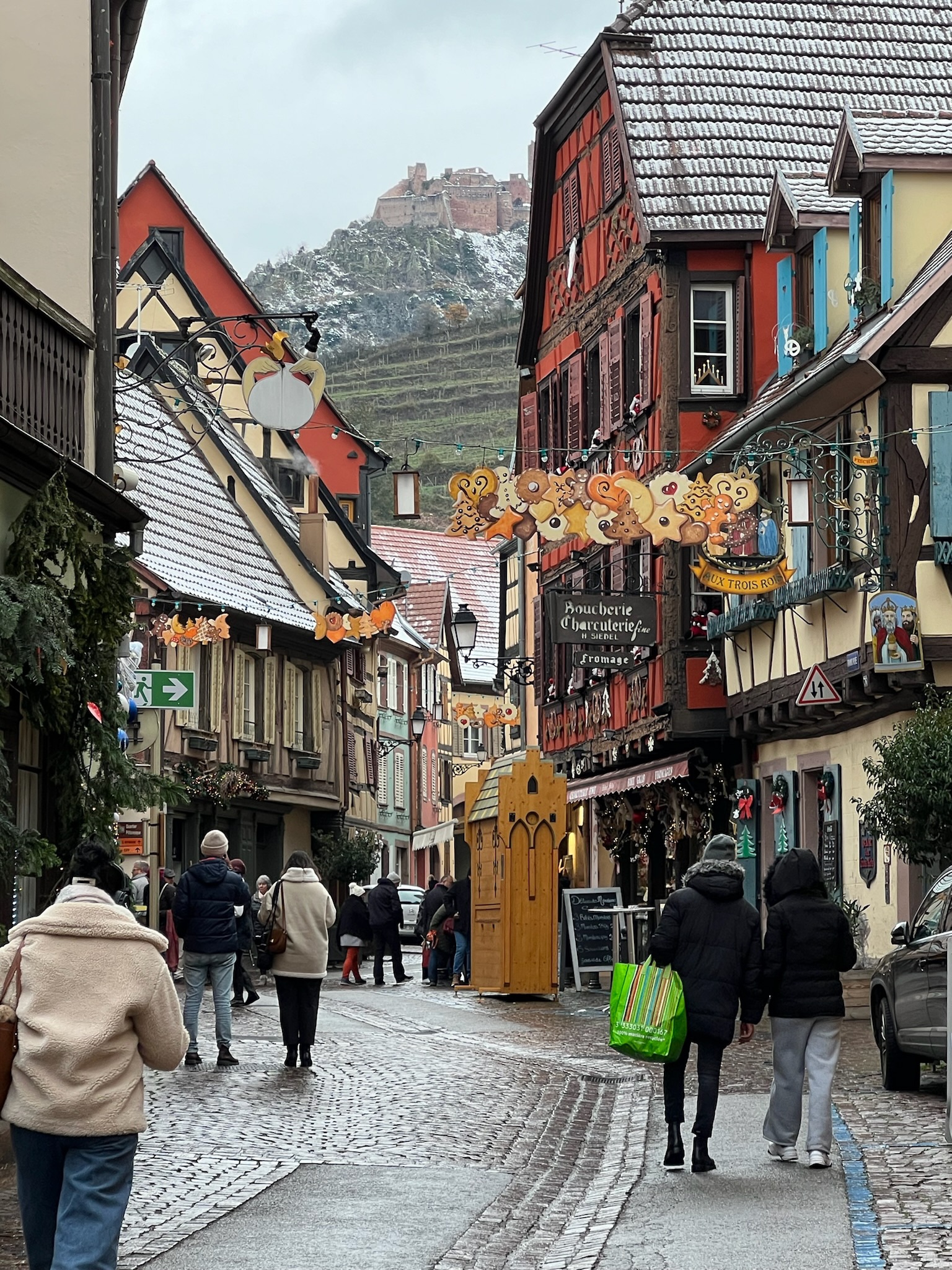
The next few days were a blur of Christmas markets and storybook villages: Riquewihr, Ribeauvillé, and Colmar. Each one dressed like it was auditioning for a postcard. Half-timbered houses leaned together under garlands of pine and gingerbread men strung from eaves. The air was cold enough to make the mulled wine feel like medicine. Somewhere between the roasted chestnuts and the sound of choirs echoing off cobblestones, I realized Alsace doesn’t just decorate for Christmas; it inhabits it.
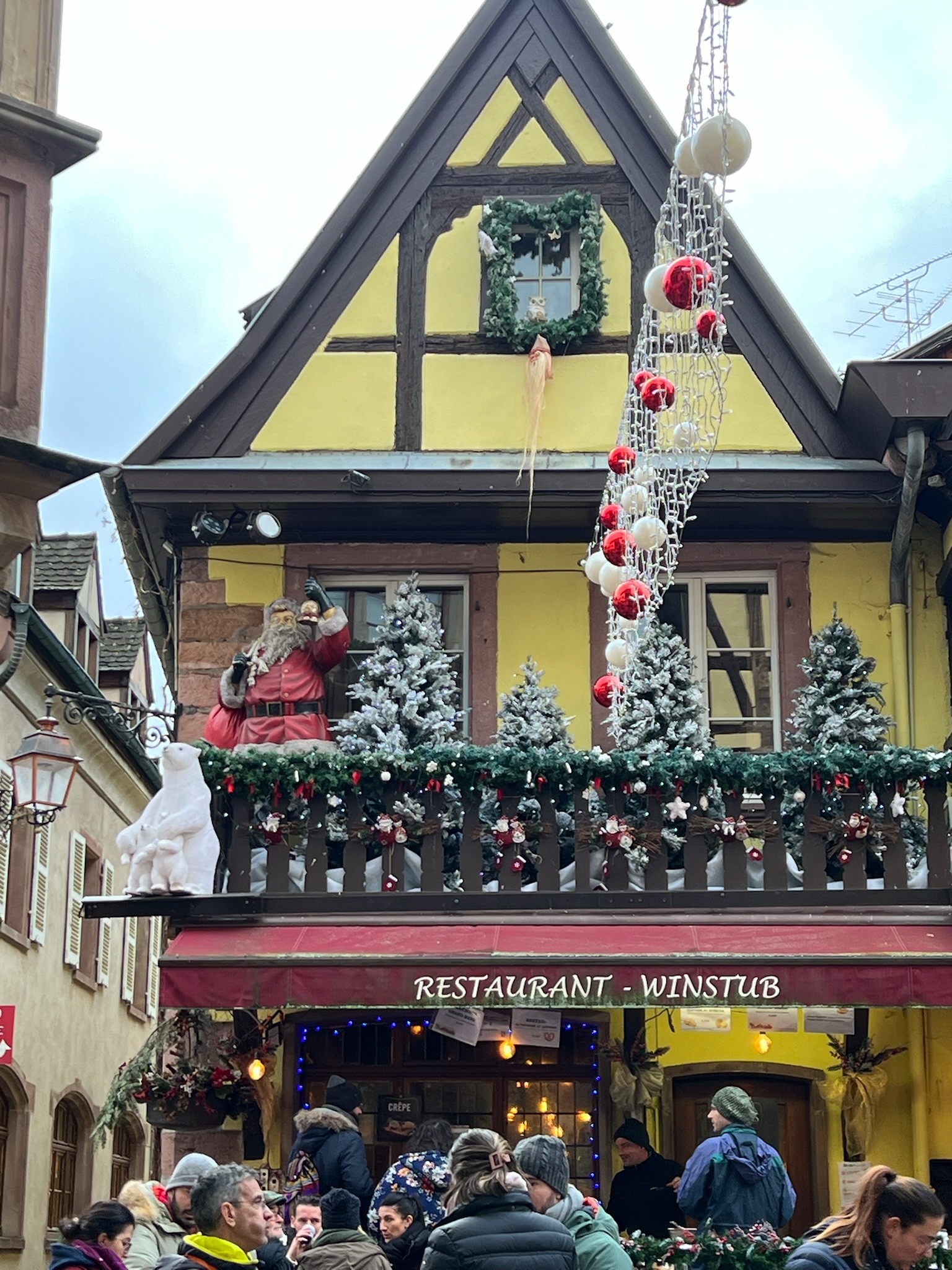
For Denise’s birthday, we drove ten minutes west to Barr for dinner at L’Essentiel — a name that, in true French fashion, manages to be both understated and profound. The restaurant sat quietly on a side street, glowing like a secret. Inside, the tables were covered with starched white table cloths, the lighting soft, the conversation hushed to that reverent murmur reserved for truly good meals.
Dinner unfolded like a waltz. Each course arriving with the calm precision of a kitchen that knows exactly what it’s doing. A delicate starter of seafood and citrus, then something rich and earthy, maybe duck, maybe veal. All I know is that it was perfectly timed, perfectly paired, and left no room for complaint or dessert menus. The wine, a local white, crisp and mineral, the color of winter sunlight, tied it all together.
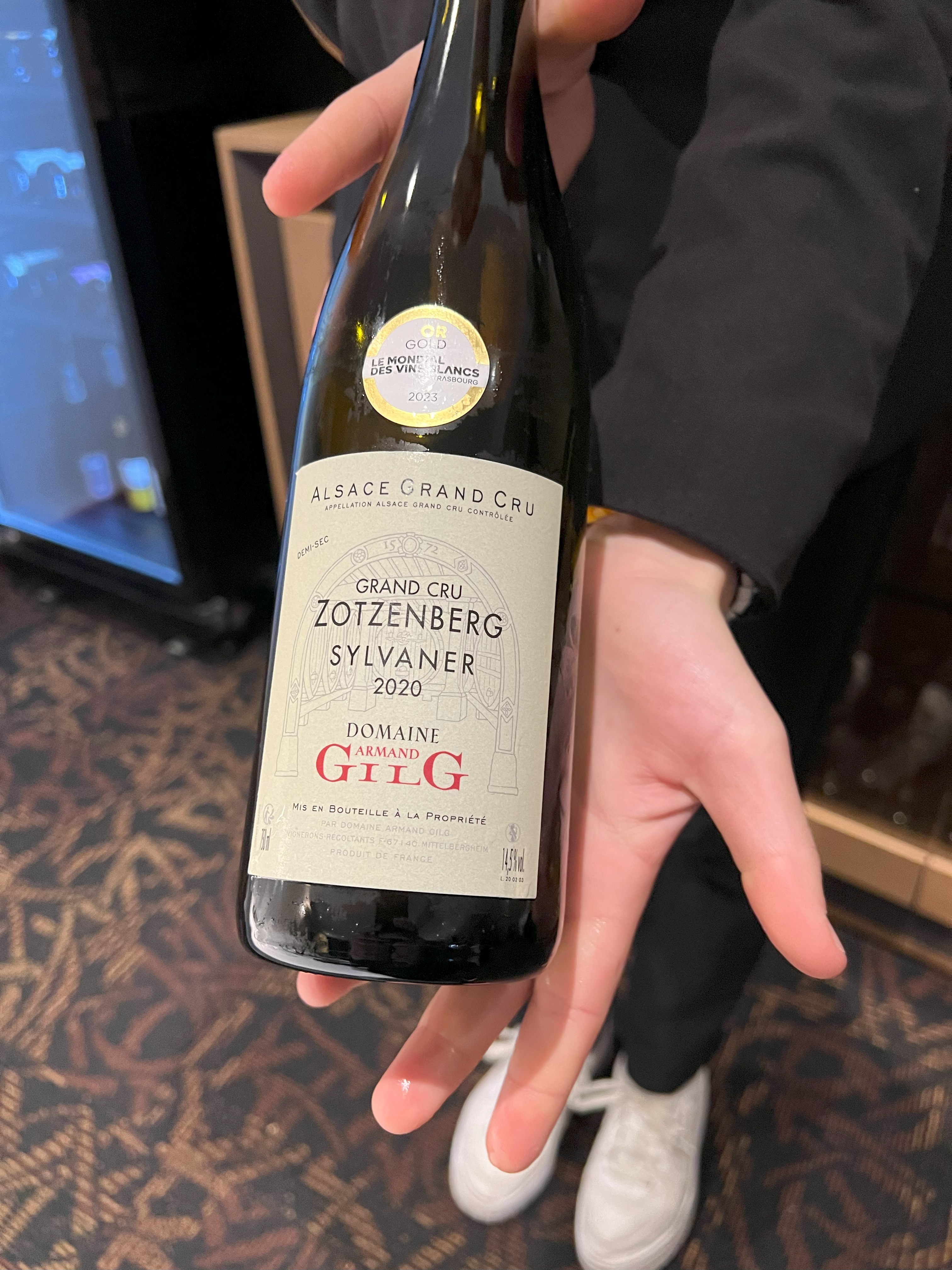
I remember glancing at Denise across the table, candlelight catching her smile, and thinking that this was it, l’essentiel. The essential. Not the uncertainty of where we would settle, not the endless fighting spirit it takes to carve out a new life, or the neverending French paperwork, but this: good wine, good food, good company, and a night that asked for nothing more.
On the drive back to Gertwiller, the road wound through sleeping vineyards, the castle ruins of Saint-Ulrich glowing faintly on the hill above Ribeauvillé. The villages were quiet again, their Christmas lights reflected in puddles of melting snow.
The next morning, Sully found a stick and immediately ran and danced with it all throughout the frosty neighboring vineyard. Within minutes, he was rolling around in the snow and frost, his nose dusted white, tail wagging like a metronome of joy.
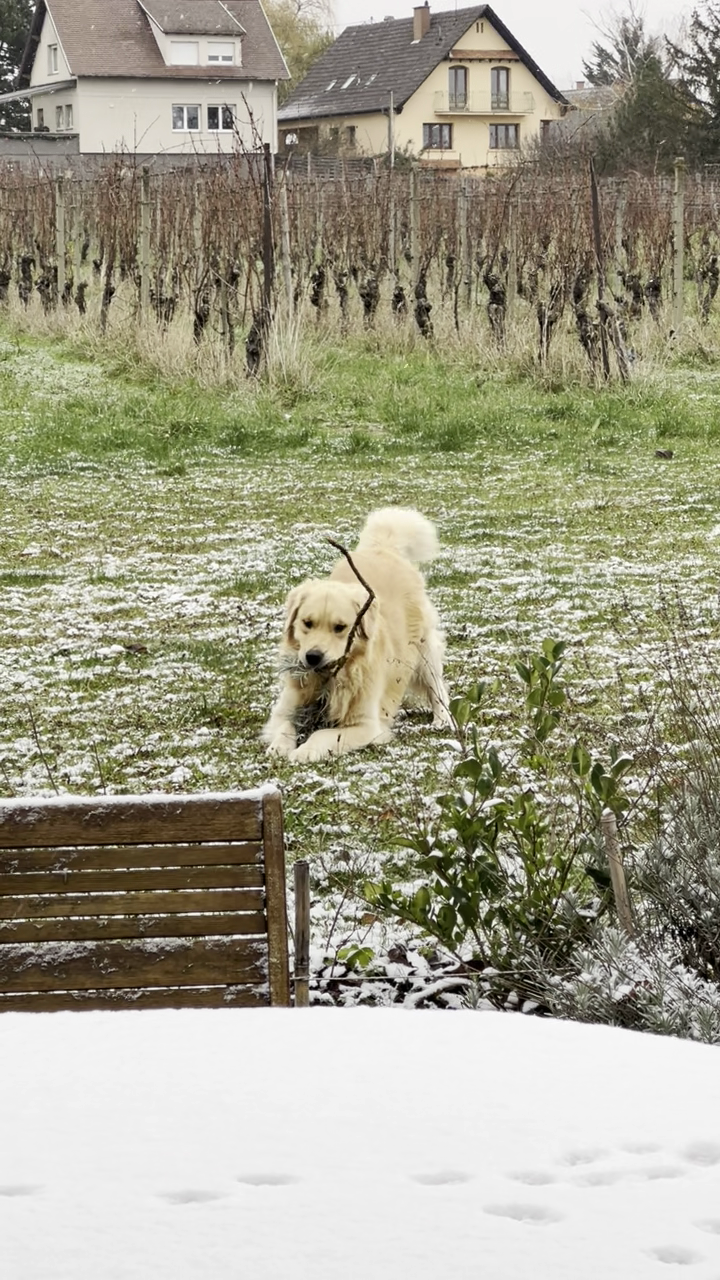
It was one of those small, ridiculous moments that somehow explain everything about life here — the beauty, the imperfection, the grace of being exactly where you are.
In a year of endless new locations, lost adapters, and bureaucratic endurance tests, Alsace felt like a reward, a reminder that not every French adventure needs to be survived.
Some just need to be savored.
One French Quirk
When I moved to France, I thought I was ready for the quirks. The two-hour lunches, the cashiers who stare at you like you just insulted their grandmother, the grocery aisles dedicated entirely to yogurt.
But nothing prepared me for the pen.
Not just any pen: the BIC 4-Color Pen. You know the one: white top, blue bottom, and four little plungers around the barrel. Blue, black, red, green. The Cadillac of school supplies… if your school year was 1978.
In America, these things disappeared somewhere between the knockers/clackers (didn’t Cindy Brady get killed by those?) and the Walkman.
But in France, they’re everywhere. Grocery stores, pharmacies, post offices — even my doctor had two of them in his pocket like surgical instruments. I asked him, “What’s the deal with these pens?” He looked at me, confused. “But it’s the best pen,” he said, as if I’d questioned gravity.
And he’s not wrong. They are kind of brilliant. Click for blue, click again for red, and if you’re feeling wild, go green. No digging through drawers. No losing pens to mysterious forces.
One pen. Four moods.
But what fascinates me isn’t the pen, it’s what it says about France.
This country doesn’t chase “new.” It perfects what already works. The BIC 4-Color pen was invented here in the 1970s, and half a century later, it’s still the standard.

Because in France, if something’s functional, beautiful, and a little bit nostalgic, why change it?
There’s a quiet comfort in that kind of loyalty. A sense that not everything needs to evolve — some things just need to endure.
I’m almost tempted to buy one myself. Then every time I click between blue and red, I would think, maybe the French are onto something.
Maybe life doesn’t need an upgrade.
Until next time.
Thanks for subscribing and thanks for reading.
Paul

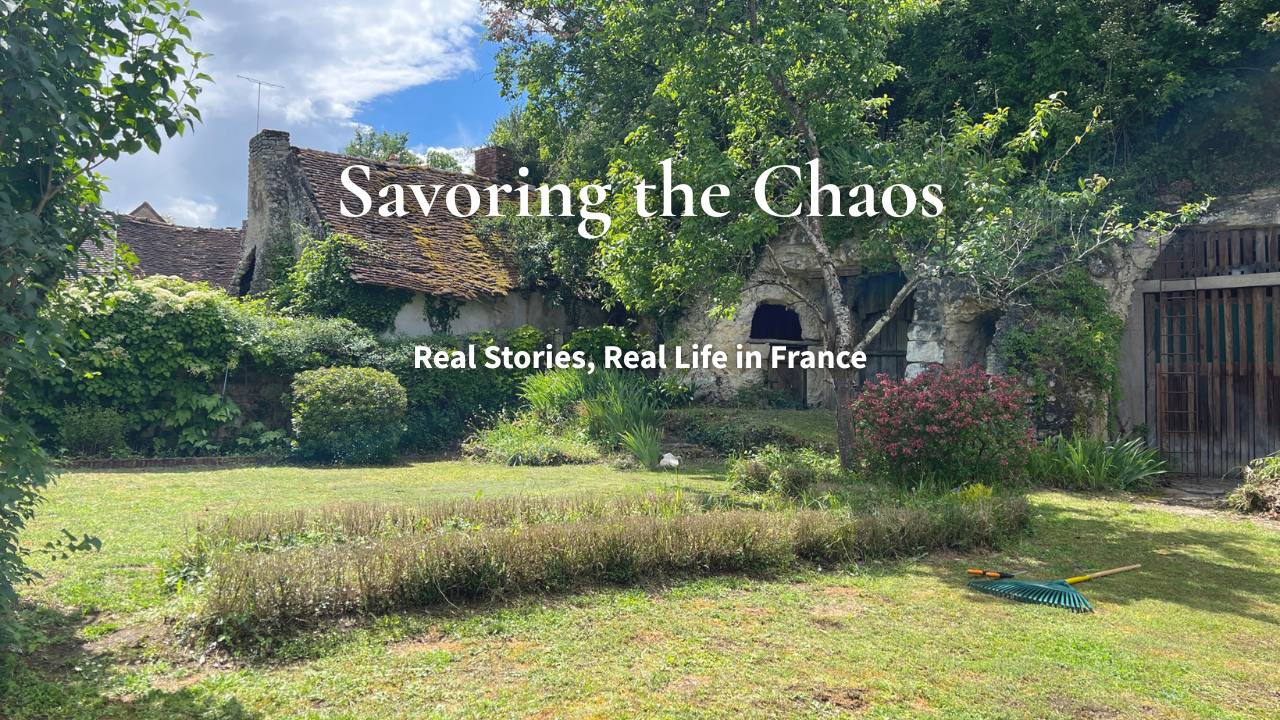
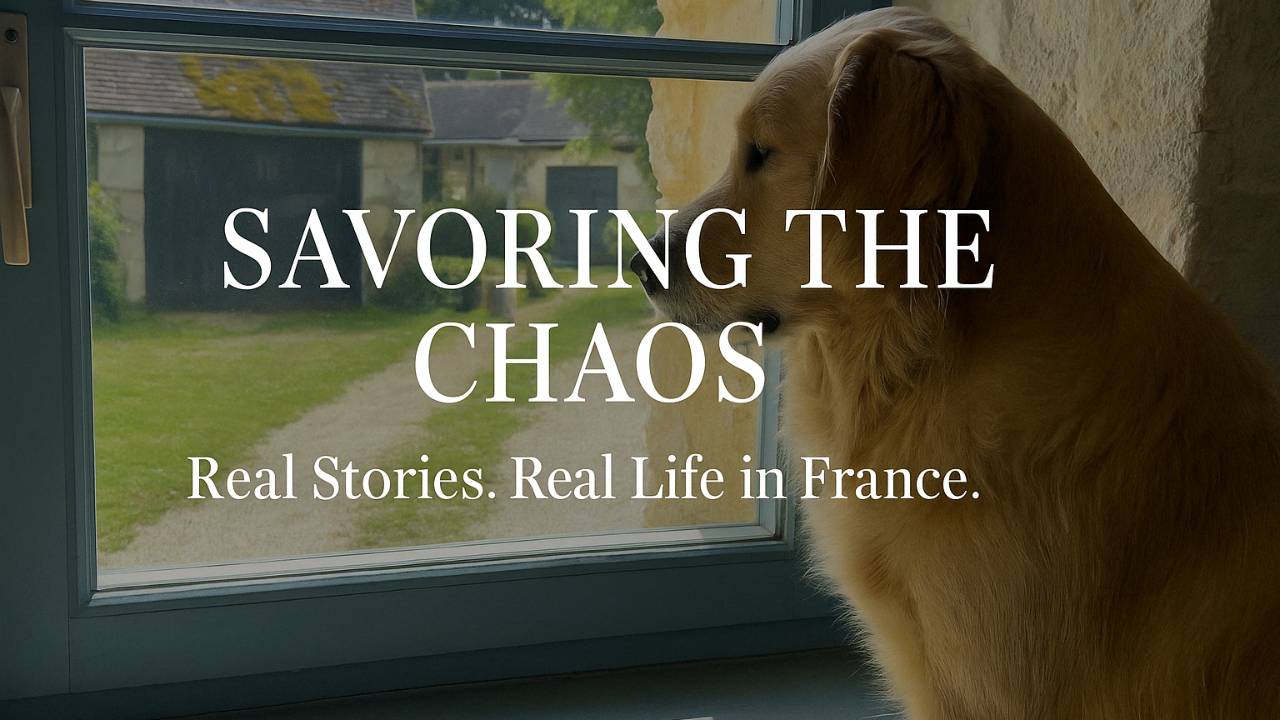

Responses